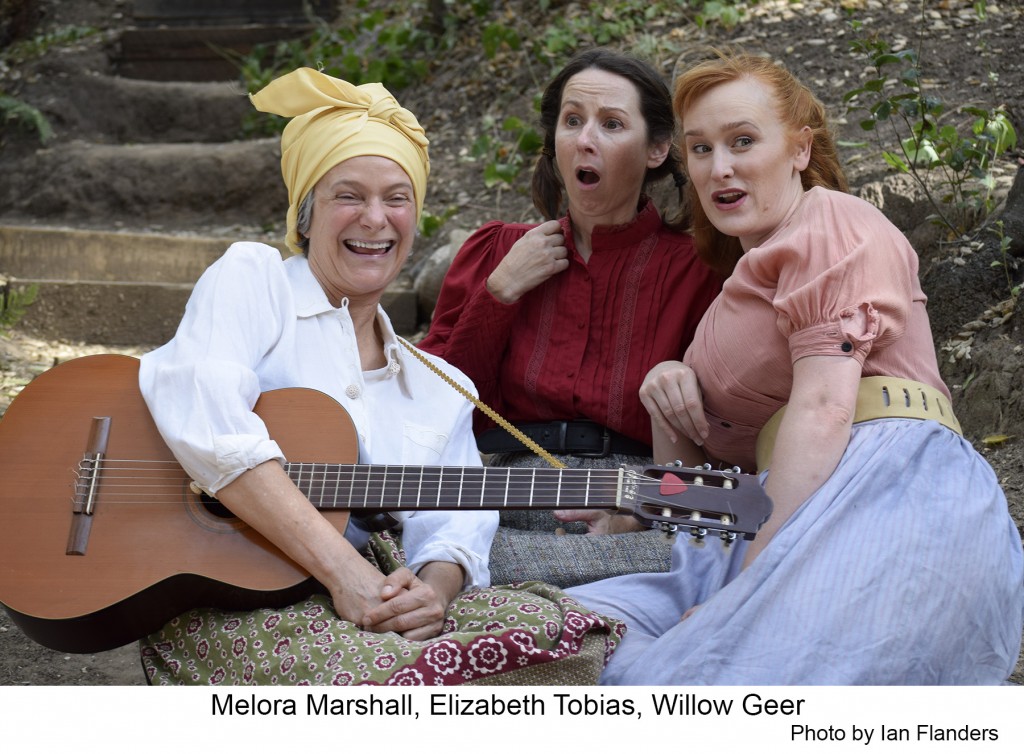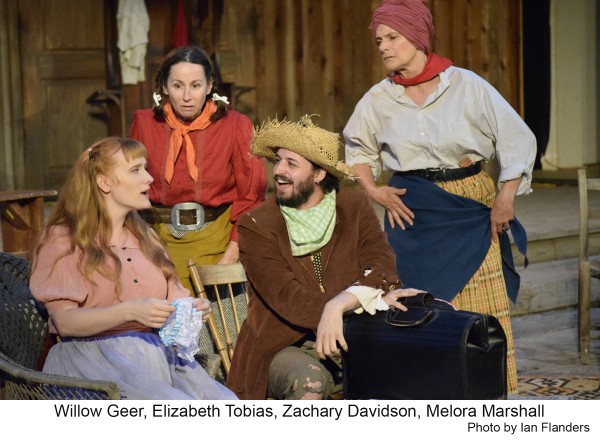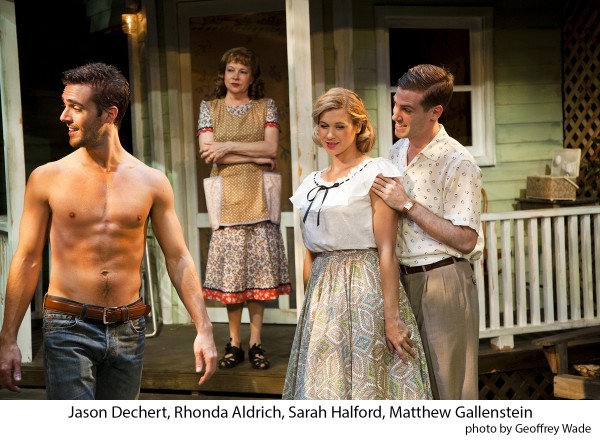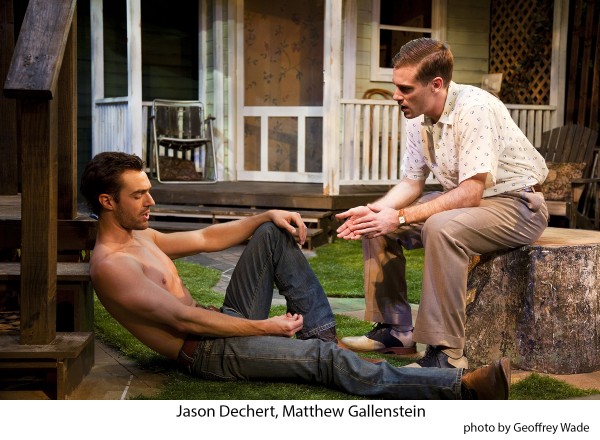There may be no better place to see a summer show than under the stars at Topanga Canyon’s Theatricum Botanicum, on a stage constructed in the middle of ancient tall trees in a hillside clearing. And while Lynn Riggs’ Green Grow the Lilacs is not the sunniest of plays, it remains a pastoral comedy whose darker moments seem to be there primarily to offset the complacency of the laidback bucolic mood.
Riggs, who was from Oklahoma, never entirely left it, even though he moved around a lot, living in Santa Fe, New York and even Los Angeles, where he wrote screenplays for Paramount (and briefly was a copy editor for the L.A. Times). He wrote Lilacs in 1930 in Paris, of all places, much of it at the Café Des Deux Magots, the famous literary hangout of the 20th Century French literary famous. When Lilacs was tapped as the template for the 1943 Oklahoma!, royalties from the Rodgers and Hammerstein musical became a welcome source of steady income for the writer.
Still, Riggs’ comic cornpone style fell out of fashion after World War II and his plays have been rather unjustly neglected since. So this Lilacs revival is something of a treat, thanks to the al fresco setting, but more significantly because director Ellen Geer has cast the play well, with many well-chosen Botanicum veterans, eclectic musicians and an overall energetic and gifted company.

This simple tale of cozy country folk and a shy love affair under assault from an unsavory villain, is benign entertainment. It’s not great theatre, but it is good theatre. If the play’s a bit wordy and if the characters are stereotypes to our more jaded eyes, these are the minor casualties of its age and changing tastes. There is, on the other hand, something seductive about a chance to dip into a mythical America, listen to lovely traditional songs (performed acoustically) and pine a little — as we all do — for the simpler times that probably never existed.

Melora Marshall is a humdinger of an Aunt Eller, never missing a beat and more tender than gruff in a role you can neither dislike nor dismiss. Willow Geer is a luscious Laurey, and Elizabeth Tobias a nicely cartoonish Ado Annie, while Jeff Wiesen’s tall and lanky Curly is the forthright prince of a cowboy that Curly ought to be.

Special mention must go to Steven B. Green who gives us a seriously menacing Jeeter (rumbling basso included), and to Zachary Davidson who is pure athletic fun as the wily itinerant peddler whose comic antics can’t help but sweeten his sales.
Green Grow the Lilacs is a fairytale and summer is a good time for fairytales, especially when they are told well — and take place in a dell.
… AND SUMMER PICNICS
Across the San Fernando Valley, in grittier North Hollywood, there is a Picnic of another sort, although certain similarities prevail.

The Antaeus Theatre Company production of William Inge’s 1953 Pulitzer Prize-winning play, Picnic, provides a more sobering type of nostalgia. This play too has its age, and its dark recesses, but it is written in an impressively contemporary hand; the characters that people its Kansan backyard on this hot and muggy Labor Day are made of real sinew, emotion and bone.
Like so many of his characters, Inge was a profoundly lonely man, at once tortured and terrorized by his homoerotic impulses and lacking in the courage to deal with them well. A lot of that pent up confusion made its way into the characters that people his plays and screenplays. Picnic is all about how we pine for the kind of transcendent and often evanescent love that will take us out of ourselves — something Inge himself apparently never found.
Flo Owens (Rhonda Aldrich) the single mother of two teen-age girls lives a modest, humdrum life in the boredom of a small Kansas town, hoping Madge, her good-looking older daughter, will marry Alan (Matthew Gallenstein), who loves her and is the scion of the wealthy family in town.
The quiet of this Labor Day morning is disrupted by the appearance of the rowdy Hal (Jason Dechert), an itinerant handsome fella and some time college buddy of Alan’s, who’s new in town and cleaning the next door neighbor’s yard in exchange for breakfast. When Hal and Madge meet, however, it’s more than breakfast that’s in play. And when the two surrender to their mutual attraction, all bets are off.
What elevates the play out of the realm of soapy family drama is the deftness of the writing. Inge’s characters are flawed, believable, nuanced and deeply human. The coalescing events have the inevitability of Greek tragedy. There is no way to spin them. Even the parallel subplot in which Rosemary (Shannon Holt), the shrill, middle-aged schoolteacher who rents a room from Flo and talks her middle-aged beau Howard (Josh Clark) into marrying her against his better judgment, is intricately woven into the main story. Nothing in the play is extraneous. Every element serves the central premise of love, danger, loneliness, risk and loss.

Cameron Watson has mounted an exquisite production in which every detail is richly penciled in. Antaeus “partner casts” its productions; two completely different casts take turns performing in the course of the run, so that more of the company’s member actors get a chance to strut their stuff (and in a pinch can replace one another).
The team I was privileged to see (dubbed “the Deviled Eggs”) was very well cast. Most notable in it were Dechert, delivering a Hal, whose boasting and restlessness are a poor shield for his absence of self-worth — and Shannon Holt, top-notch as the slightly desperate spinster schoolteacher, panicking in her loneliness as she watches the years relentlessly passing her by…

Sarah Halford is a lovely, moody Madge, and Jackie Preciado bold and smart as her tomboy younger sister Millie. The tiny Janellen Steininger is the mousy next-door neighbor, Mrs. Potts, and Aldrich gives us a Flo Owens, whose worried nattering is the manifestation of a woman fearing for the welfare of two daughters about to leave the nest.
Designer Robert Selander has done a masterful job of squeezing a compact, tired, realistic indoor/outdoor set onto the small Antaeus stage. The costumes by Terri A. Lewis faithfully reflect the early 1950s, but Jared A. Sayeg’s subtle lighting steals the show by making us feel and see the heat and hours of the day, as well as the season and the geographical center of the place. An admirable achievement all around.
GRACE NOTE: A reader of last week’s review of the Ebony Theatre’s The Gospel at Colonus chided me (gently) for alluding to, but apparently not clearly defining the parallels, between the production and the recent tragic events at the Emanuel AME church in Charleston, SC. After re-reading what I wrote I can see that someone unfamiliar either with Sophocles’ Oedipus at Colonus or the Lee Breuer/Bob Telson 1983 musical adaptation, might feel out of the loop. So here is an attempt at that clarification. Both works are about the aftermath of crime. Oedipus unwittingly killed his father and married his mother, fathering children with her. After blinding himself in penance, he sought and found redemption. Dylann Roof wittingly killed nine innocent members of the Emanuel AME church’s congregation, whose gracious and enlightened families chose to respond to the murder with forgiveness. It is in that redemptive gesture that the parallels emerge.
FINALLY, SOME GOOD NEWS: Deaf West’s production of Spring Awakening, that played Inner City Arts in Los Angeles and became a hit last month when it transferred to The Wallis Annenberg Center for the Performing Arts in Beverly Hills, is now headed for a limited engagement at Broadway’s Brooks Atkinson Theatre Sept. 8 to Jan. 9, 2016. How better to illustrate the difficulty of communication, than with this stunning musical version of the Frank Wedekind play that employs deaf and hearing actors, with the hearing ones speaking and singing for the deaf ones? A win-win for everyone. Here’s hoping for better sound design than what prevailed at The Wallis. Tickets are on sale now at Ticketmaster…
Top image: l-r, Jeff Wiesen, Melora Marshall and Willow Geer in Green Grow the Lilacs at Theatricum Botanicum. Photo by Ian Flanders.
WHAT: Green Grow the Lilacs
WHERE: Theatricum Botanicum, 1419 North Topanga Canyon Blvd., Topanga, CA 90290.
WHEN: Fridays, Aug. 21 & 28, Sept. 4 & 11, 7:30pm; Saturdays, July 18, Aug. 8, 22, 29, Sept. 5 & 26, 7:30pm; Sunday, July 26, Aug. 2, Sept. 13 & 20; Sunday, Aug. 16 ONLY, 3:30pm. Ends Sept. 26.
HOW: Tickets, $27-$39.50; children 7-12, $10; children 6 and under, FREE. Available at www.theatricum.com or by phone at 310.455.3723.
WHAT: Picnic
WHERE: Antaeus Theatre Company, 5112 Lankershim Blvd., North Hollywood, CA 91601.
WHEN: Fridays, 8pm; Saturdays 2 & 8pm; Sundays, 2pm. Ends August 16.
HOW: Tickets, $30-$34, available at www.Antaeus.org or by phone at 818.506.1983.
